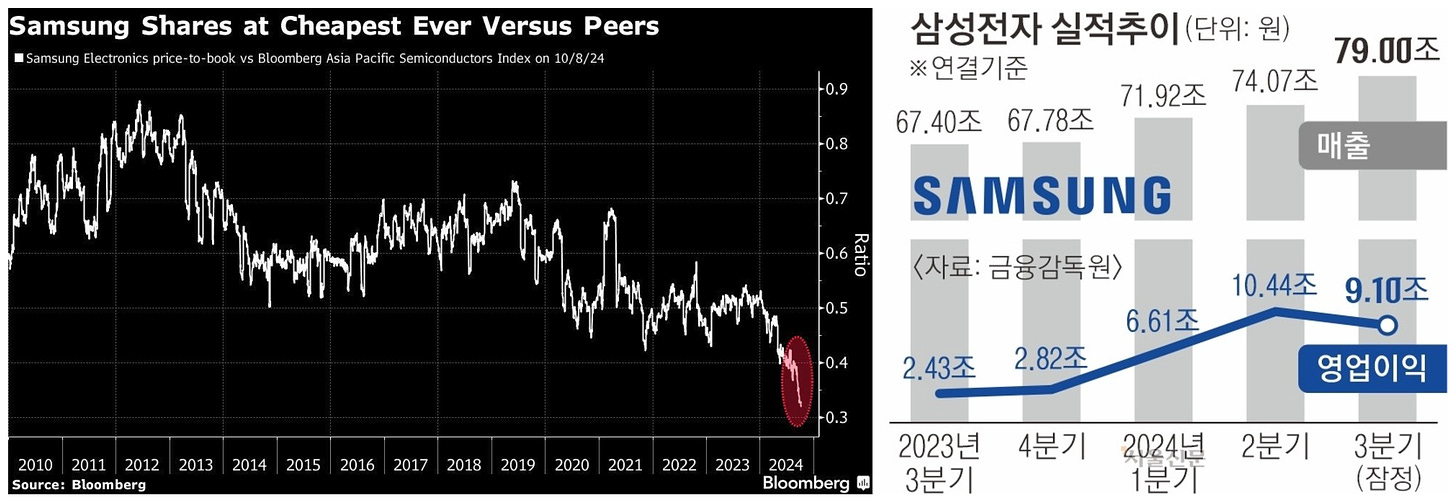
Korea is in Danger
The Kimchi Premium #6: Recap of Korean crypto community trends for week 4 in October

The Kimchi Premium is a weekly series that looks back at the hottest topics in the Korean crypto community
If you’re one of those people who can’t spend a single second without some kind of background noise playing like myself, you may have seen one of those videos on YouTube talking about Samsung.
Yes, that Samsung. The electronics manufacturer and the one company that rules Korea. For those who are not aware, the Samsung Group's revenue accounted for approximately 22.4% of South Korea's GDP of $1.67 trillion. If the Saudis have oil, Koreans have Galaxy phones and memory chips.
More recently, Samsung Electronics has become the topic in the Korean internet as they missed their projected net profit goals. This led to an outburst of concerns regarding to the company’s outook as a semiconductor manufacturer and retail electronics designer.
How bad is it? Jeon Young-hyun, head of Samsung Electronics' semiconductor business, apologized in a letter to investors.
Samsung Electronics warned its third-quarter profit would come in below market expectations and apologised for the disappointing performance with the tech giant lagging its rivals in supplying high-end chips to Nvidia in the booming AI market.
The rare apology illustrates the challenges facing the company, which has been the world's biggest memory chipmaker for three decades but is battling growing competition in both conventional and advanced chips.
Samsung said its AI chip business with an unidentified major customer was hit by a delay, while Chinese chip rivals increased supplies of conventional chips, contributing to the decline in its semiconductor earnings.
[…]
Samsung's late response to the AI chip market increases its reliance on traditional, lower-margin chips, making it more vulnerable to competition from China and slowing demand for smartphones and PCs, analysts say.
High-margin chips used in AI servers are driving a recovery in the chip market after a post-pandemic downturn last year. Still, Samsung has lagged SK Hynix in supplying high-bandwidth memory (HBM) chips to AI leader Nvidia.

When you put this earning shock into numbers, it’s only a 15% less than expectations which may not sound like a big deal for people in crypto. But Samsung Electronics is a manufacturer, meaning they make money by actually selling things of value.
The most juicy part of all this are the testimonials coming from actual Samsung employees. For example, DongA interviewed one person who worked at the semiconductor division in Samsung:
There's a strong focus on efficiency now - doing only what's easiest without making any changes. In the past, when employees on the ground suggested ideas, these would at least be reviewed and sometimes make their way up the chain. Now, decisions seem predetermined.
The fear of failure is absolute.
As a result, they either completely avoid technically challenging new projects, or paradoxically, try to pursue every tech trend without focus or prioritization - just to avoid failure. The fear is that if they skip something and a competitor succeeds with it, they'll be held responsible.
Former DS Division Head Oh-Hyun Kwon (2011-2017) believed in strategic focus. He emphasized "Smart Work" practices and stressed the importance of maintaining work-life balance. However, his successor Ki-Nam Kim (2017-2022) had a micromanagement style. After introducing the "Saturday Weekly Meetings" attended by Chairman Lee Jae-yong, a culture of endless report-focused meetings throughout the week emerged. The much-discussed decision to withdraw from HBM (High Bandwidth Memory) was also made during this period.
HBM essentially stacks DRAM layers. At the time, the DRAM division had significant influence, so they believed 'we can cover everything with our DRAM technology.' Their attitude was, "Why bother with stacking when we can just focus on making great DRAM? Stacking is complicated anyway."
But wait, there’s more:
*The Business Support TF, commonly known as “HH”, is what we refer to when we say "reporting to Seocho." Even the head of the semiconductor division can't make many decisions independently.
In 2019, Apple wanted to use Samsung's modems in their iPhones. While the System LSI president was eager to proceed, HH rejected the idea. Their reasoning was that since the iPhone competes with Galaxy, supplying them would enhance iPhone's competitiveness. Looking back, if we had supplied them then, we might have been able to overtake Qualcomm.
When writing reports, we get instructions to “write so that even an elementary school student can understand.” It's absurd that executives with elementary-level technical knowledge, not even high school level, are making these decisions.
We're told to minimize technical terminology. If we absolutely must use technical terms, we have to explain them in simple language in footnotes.
And because decisions come from the top, the reporting line has become extremely long. Reports go up and down through Part → Group → Team → Development Office → Division → Seocho.
Decisions are not only slow but get distorted along the way.
If the working-level staff reports that “8-9 out of 10 risk factors are red (meaning dangerous),” they'll say “change some reds to yellow.” Then when it goes up again with the yellows, they'll say “why yellow? Can't we make some of these blue?” And on the next round, “that one must stay yellow. It stands out too much. Add some conditions and try making it blue.”
Executives just want to rush things because they need to show results in the next year. They don't care if it falls apart during their successor's term. The same goes for interdepartmental barriers. When multiple departments work together, they keep hiding their own department's problems as much as possible. Then when another department has issues, they use it as an excuse, saying “that's why it won't work.”
Was it like this all the time?
Yes.
The whole Samsung story reminded me of my experience in the Korean army. I still remember the moment I arrived at my designated barracks after boot camp. It felt like I was dropped in a kindergarten.
Nobody wanted to take on any responsibility, nobody had purpose, nobody cared. It was just a group of short-fused young men pretending to know what they were doing. Turning a blind eye to mistakes and covering up their wrongdoings were essential to survive.
This culture resulted in utter incompetence to the point that everything felt like a joke. The whole system only existed to be exploited by its members. Nobody was there because they wanted to. It was a half-assed attempt of a serious organization. Due to these reasons everyone is demoralized.
Once passionate cadets lost interest and sergeants no longer had the will power to continue their duties. Nobody knows what’s going on because nobody is honest. Because nobody is honest nobody can be trusted.
If the same has occurred to Samsung, I believe the corporation needs to be rehabilitated with extreme measures.
What about Korean crypto companies?
I’ve only been employed at two companies and heard stories from people at other companies. Seems like most Korean crypto companies aren’t that bad, but I think there is a huge shortage in talent because simply not many know what’s going on in the trenches.
Of course there are “researchers” who can write long-form content and spew technical jargon. But that is the quickest way to become irrelevant in this market. And that is why I say there is (soon to be) a shortage in talent.
From my observation, the builder community is yet to embrace crypto’s speculative properties as PMF. Not to say that there aren’t any degen builders, but I think that many builders are still stuck in a rigid mindset.
But is that bad? Absolutely not. These stubborn people are actually the type of people who change the world. All I am saying is that the builder community should be more open about emergent properties, instead of rejecting it. We cannot make arbitrary conclusions on a market or an industry’s outlook, but only adapt to change.
Moreover, shortage of talent also derives from the language barrier. I think crypto is one of the most hardest things to catch up with due to its fast pace in trends. Especially when the industry is tied up in one room called X, in which attention levels dictate the amount of money you can make is pretty insane if you think about it. And to be somewhat competent one must be able to understand the nuances from memes and Tweets, which is even more insane.
Based on my experience, English proficiency is the biggest factor that influences one’s capability to filter signal from noise. But again, English is also not a sole factor to judge a person’s future potential because I know people who can’t speak a single world in English but is far more knowledgable than anyone I met in this industry.